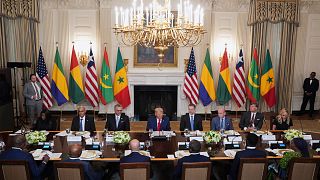USA
The U.N. General Assembly has approved a blueprint to bring the world’s increasingly divided nations together to tackle 21st-century challenges.
Those range from climate change and artificial intelligence to escalating conflicts and increasing inequality and poverty.
The 42-page “Pact for the Future” challenges leaders of the 193 U.N member nations to turn promises into real actions that make a difference to the lives of the world’s more than 8 billion people.
The pact was adopted at the opening of the two-day “Summit of the Future” called by U.N. Secretary-General Antonio Guterres.
He said the group was gathered to, as he put it, “bring multilateralism back from the brink.”
It includes 56 actions on issues including eradicating poverty, mitigating climate change, achieving gender equality, promoting peace and protecting civilians, and reinvigorating the multilateral system to “seize the opportunities of today and tomorrow.”
Secretary-General Guterres singled out a number of key provisions in the Pact of the Future and two accompanying annexes, a Global Digital Compact and Declaration on Future Generations.
The pact commits world leaders to reform the 15-member Security Council, to make it more reflective of today’s world and “redress the historical injustice against Africa,” which has no permanent seat, and to address the under-representation of the Asia-Pacific region and Latin America.
It also “represents the first agreed multilateral support for nuclear disarmament in more than a decade,” Guterres said, and it commits “to steps to prevent an arms race in outer space and to govern the use of lethal autonomous weapons.”
The Global Digital Compact “includes the first truly universal agreement on the international governance of artificial intelligence,” the U.N. chief said.
The compact commits leaders to establish an Independent International Scientific Panel in the United Nations to promote scientific understanding of AI, and its risks and opportunities. It also commits the U.N. to initiate a global dialogue on AI governance with all key players.
The pact’s actions also include measures “to mount an immediate and coordinated response to complex shocks” including pandemics, Guterres said. And it includes “a groundbreaking commitment by governments to listen to young people and include them in decision-making.”
As for human rights, Guterres said, “In the face of a surge in misogyny and a rollback of women’s reproductive rights, governments have explicitly committed to removing the legal, social and economic barriers that prevent women and girls from fulfilling their potential in every sphere.”
“We have opened the door. It is now up to all of us to step through it. Because this is not just about understanding each other – it’s also about taking action. Today, I challenge you to take action,” Guterres added.













Go to video
ICC warns of a dire humanitarian crisis in Sudan as the war rages on
02:06
UN report reveals 4.6 million people struggling with food insecurity
01:16
Sean 'Diddy' Combs found guilty on two counts, escapes prison for life
01:22
World will have to learn to live with heatwaves, UN says
01:39
Sustainable development financing conference opens in Seville
01:35
UN and Haitian officials mark one year since Kenyan police arrived to support security efforts